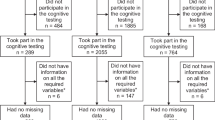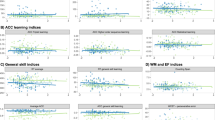Abstract
The relationship between habitual sleep and cognition in older adults with sleep complaints is poorly understood, because research has focused on younger adults, used experimental or retrospective quasi-experimental designs, and generally produced equivocal results. Prospective studies using sleep diaries are rare, but may provide important insights into this relationship as they offer greater ecological validity and allow for examination of the impact of night-to-night variability in sleep (an often overlooked aspect of sleep) on cognitive performance. Seventy-two older adults (M age = 70.18 years, SDage = 7.09 years) completed fourteen consecutive days of sleep diaries and paper/pencil self-administered cognitive tasks, including measures of processing speed (Symbol Digit) and reasoning (Letter Series). Regression analyses revealed increased average total wake time (TWT) during the night was associated with higher Symbol Digit scores, β = 0.45, P < 0.05. Night-to-night variability in either total sleep time (TST) or TWT was not associated with either cognitive measure. Implications and potential explanations for these initially counterintuitive findings are discussed.
Similar content being viewed by others
References
Allaire, J. C., & Marsiske, M. (2005). Intraindividual variability may not always indicate vulnerability in elders’ cognitive performance. Psychology and Aging, 20, 390–401.
Altena, E., Van Der Werf, Y. D., Strijers, R. L. M., & Van Someren, E. J. W. (2008a). Sleep loss affects vigilance: Effects of chronic insomnia and sleep therapy. Journal of Sleep Research, 17(3), 335–343.
Altena, E., Werf, Y. D. V. D., Sanz-Arigita, E. J., Voorn, T. A., Rombouts, S. A. R. B., Kuijer, J. P. A., et al. (2008b). Prefrontal hypoactivation and recovery in insomnia. Sleep: Journal of Sleep Research & Sleep Medicine, 31(9), 1271–1276.
Altena, E., Ramautar, J. R., Van Der Werf, Y. D., & Van Someren, E. J. (2010). Do sleep complaints contribute to age-related cognitive decline? Progress in Brain Research, 185, 181–205.
Bastien, C. H., Fortier-Brochu, E., Rioux, I., LeBlanc, M., Daley, M., Morin, C. M., et al. (2003). Cognitive performance and sleep quality in the elderly suffering from chronic insomnia. Relationship between objective and subjective measures. Journal of Psychosomatic Research, 54(1), 39–49.
Beck, A. T., Steer, R. A., & Brown, G. K. (1996). Manual for the Beck depression inventory-II (2nd ed.). San Antonio, TX: Psychological Corporation.
Binks, P. G., Waters, W. F., & Hurry, M. (1999). Short-term total sleep deprivations does not selectively impair higher cortical functioning. Sleep, 22(3), 328–334.
Bixler, E. O., Kales, A., Jacoby, J. A., Soldatos, C. R., & Vela-Bueno, A. (1984). Nocturnal sleep and wakefulness: Effects of age and sex in normal sleepers. International Journal of Neuroscience, 23(1), 33–42.
Bonnet, M. H., & Arand, D. L. (2010). Hyperarousal and insomnia: State of the science. Sleep Medicine Reviews, 14(1), 9–15.
Brezinova, V. (1975). The number and duration of the episodes of the various EEG stages of sleep in young and older people. Electroencephalogr Clin Neurophysiol, 39(3), 273–278.
Cain, S. W., Silva, E. J., Chang, A. M., Ronda, J. M., & Duffy, J. F. (2011). One night of sleep deprivation affects reaction time, but not interference or facilitation in a Stroop task. Brain and Cognition, 76(1), 37–42.
Carskadon, M. A., Brown, E. D., & Dement, W. C. (1982). Sleep fragmentation in the elderly: Relationship to daytime sleep tendency. Neurobiology of Aging, 3(4), 321–327.
Chambers, M. J., & Keller, B. (1993). Alert insomniacs: Are they really sleep deprived? Clinical Psychology Review, 13(7), 649–666.
Cohen, J. (1988). Statistical power analysis for the behavioral sciences (2nd ed.). Hillsdale, New Jersey: Lawrence Erlbaum.
Drake, C. L., Roehrs, T. A., Burduvali, E., Bonahoom, A., Rosekind, M., & Roth, T. (2001). Effects of rapids versus slow accumulation of eight hours of sleep loss. Psychophysiologu, 38, 979–987.
Drummond, S. P., Brown, G. G., Stricker, J. L., Buxton, R. B., Wong, E. C., & Gillin, J. C. (1999). Sleep deprivation-induced reduction in cortical functional response to serial subtraction. Neuroreport, 10(18), 3745–3748.
Drummond, S. P., Brown, G. G., Gillin, J. C., Stricker, J. L., Wong, E. C., & Buxton, R. B. (2000). Altered brain response to verbal learning following sleep deprivation. Nature, 403(6770), 655–657.
Edinger, J. D., Marsh, G. R., Mccall, W. V., Erwin, C. W., Lininger, A. W., & Assoc, A. S. D. (1991). Sleep variability across consecutive nights of home monitoring in older mixed dims patients. Sleep, 14(1), 13–17.
Espie, C. A. (1991). The psychological treatment of insomnia. Chichesster, UK: J. Wiley and Sons.
Foley, D. J., Monjan, A. A., Brown, S. L., Simonsick, E. M., Wallace, R. B., & Blazer, D. G. (1995). Sleep complaints among elderly persons: An epidemiologic study of three communities. Sleep, 18(6), 425–432.
Folstein, M. F., Folstein, S. E., & Mchugh, P. R. (1975). Mini-mental state—practical method for grading cognitive state of patients for clinician. Journal of Psychiatric Research, 12(3), 189–198.
Gillin, J. C., Duncan, W. C., Murphy, D. L., Post, R. M., Wehr, T. A., Goodwin, F. K., et al. (1981). Age-related changes in sleep in depressed and normal subjects. Psychiatry Research, 4(1), 73–78.
Harrison, Y., & Horne, J. A. (1997). Sleep deprivation affects speech. Sleep, 20(10), 871–877.
Harrison, Y., & Horne, J. A. (1999). One night of sleep loss impairs innovative thinking and flexible decision making. Organizational Behavior and Human Decision Processes, 78(2), 128–145.
Harrison, Y., & Horne, J. A. (2000). The impact of sleep deprivation on decision making: A review. Journal of Experimental Psychology, 6, 236–249.
Horne, J. A. (1988). Sleep loss and “divergent” thinking ability. Sleep, 11(6), 528–536.
Howden, L. M. & Meyer, J. A. (2011). Age and sex composition: 2010 census briefs. U.S. department of commerce, economics and statistics administration, U.S. Census Bureau.
Jones, K., & Harrison, Y. (2001). Frontal lobe function, sleep loss and fragmented sleep. Sleep Medicine Reviews, 5, 463–475.
Kronholm, E., Sallinen, M., Suutama, T., Sulkava, R., Era, P., & Partonen, T. (2009). Self-reported sleep duration and cognitive functioning in the general population. Journal of Sleep Research, 18(4), 436–446.
Lezak, M. D. (1995). Neuropsychological assessment (3rd ed.). New York: Oxford University Press.
Lichstein, K. L., Riedel, B. W., Lester, K. W., & Aguillard, R. N. (1999a). Occult sleep apnea in a recruited sample of older adults with insomnia. Journal of Consulting and Clinical Psychology, 67(3), 405–410.
Lichstein, K. L., Riedel, B. W., & Means, M. K. (1999b). Psychological treatment of late-life insomnia. In R. Schulz, G. Maddox, & M. P. Lawton (Eds.), Annual review of gerontology and geriatrics. Focus on interventions research with older adults (Vol. 18). New York: Springer.
Lichstein, K. L., Wilson, N. M., Noe, S. L., Aguillard, R. N., & Bellur, S. N. (1994). Daytime sleepiness in insomnia: Behavioral, biological and subjective indices. Sleep: Journal of Sleep Research & Sleep Medicine, 17, 693–702.
May, J., & Kline, P. (1987). Measuring the effects upon cognitive-abilities of sleep loss during continuous operations. British Journal of Psychology, 78, 443–455.
McCoy, K. J. M. (2004). Understanding the transition from normal cognitive aging to mild cognitive impairment: Comparing the intraindividual variability in cognitive function. Doctoral dissertation, clinical and health psychology, University of Florida.
Mccrae, C. S., Mcnamara, J. P. H., Rowe, M. A., Dzierzewski, J. M., Dirk, J., Marsiske, M., et al. (2008). Sleep and affect in older adults: using multilevel modeling to examine daily associations. Journal of Sleep Research, 17(1), 42–53.
Naismith, S. L., Rogers, N. L., Makcenzie, J., Norrie, L. M., & Lewis, S. J. G. (2010). Sleep well, think well: Sleep-wake disturbances in mild cognitive impairment. Journal of Geriatric Psychiatry and Neurology, 23(2), 123–130.
Nebes, R. D., Buysse, D. J., Halligan, E. M., Houck, P. R., & Monk, T. H. (2009). Self-reported sleep quality predicts poor cognitive performance in healthy older adults. Journals of Gerontology Series B-Psychological Sciences and Social Sciences, 64(2), 180–187.
Oosterman, J. M., van Someren, E. J. W., Vogels, R. L. C., van Harten, B., & Scherder, E. J. A. (2009). Fragmentation of the rest-activity rhythm correlates with age-related cognitive deficits. Journal of Sleep Research, 18(1), 129–135.
Pace-Schott, E. F., Hutcherson, C. A., Bemporad, B., Morgan, A., Kumar, A., Hobson, J. A., et al. (2009). Failure to find executive function deficits following one night’s total sleep deprivation in university students under naturalistic conditions. Behavioral Sleep Medicine, 7(3), 136–163.
Pilcher, J. J., Band, D., Odle-Dusseau, H. N., & Muth, E. R. (2007). Human performance under sustained operations and acute sleep deprivation conditions: Toward a model of controlled attention. Aviation Space and Environmental Medicine, 78, B15–B24.
Ram, N., & Gerstorf, D. (2009). Time-structured and net intraindividual variability: Tools for examining the development of dynamic characteristics and processes. Psychology and Aging, 24, 778–791.
Riedel, B. W., & Lichstein, K. L. (2000). Insomnia and daytime functioning. Sleep Medicine Reviews, 4(3), 277–298.
Rodriguez-Artalejo, F., Faubel, R., Lopez-Garcia, E., Guallar-Castillon, P., Graciani, A., & Banegas, J. R. (2009). Usual sleep duration and cognitive function in older adults in Spain. Journal of Sleep Research, 18(4), 427–435.
Roth, T., & Ancoli-Israel, S. (1999). Daytime consequences and correlates of insomnia in the United States: Results of the 1991 National Sleep Foundation Survey, II. Sleep, 22(2), S354–S358.
Smith, A. (1982). Symbol digit modalities test—revised: Manual. Los Angeles: Western Psychological Services.
Thurstone, T. G. (1962). Primary mental ability for Grades 9–12 (Revised ed.). Chicago, IL: Science Research Associates.
Tworoger, S. S., Lee, S., Schernhammer, E. S., & Grodstein, F. (2006). The association of self-reported sleep duration, difficulty sleeping, and snoring with cognitive function in older women. Alzheimer Disease and Associated Disorders, 20(1), 41–48.
Vance, D. E., Keltner, N. L., McGuinness, N. L., Umlauf, M. G., & Yuan, Y. Y. (2010). The future of cognitive remediation training in older adults. Journal of neuroscience in nursing, 42(5), 255–264.
Webb, W. B. (1985). A further analysis of age and sleep deprivation effects. Psychophysiology, 22(2), 156–161.
Webb, W. B., & Levy, C. M. (1982). Age, sleep-deprivation, and performance. Psychophysiology, 19(3), 272–276.
Yesavage, J. A., Brink, T. L., Rose, T. L., Lum, O., Huang, V., Adey, M., et al. (1982). Development and validation of a geriatric depression screening scale: A preliminary report. Journal of Psychiatric Research, 17(1), 37–49.
Acknowledgments
Study support was provided by the National Institutes of Health/National Institute on Aging (AG02445; Christina S. McCrae, PhD., PI).
Author information
Authors and Affiliations
Corresponding author
Rights and permissions
About this article
Cite this article
McCrae, C.S., Vatthauer, K.E., Dzierzewski, J.M. et al. Habitual Sleep, Reasoning, and Processing Speed in Older Adults with Sleep Complaints. Cogn Ther Res 36, 156–164 (2012). https://doi.org/10.1007/s10608-011-9425-4
Published:
Issue Date:
DOI: https://doi.org/10.1007/s10608-011-9425-4




